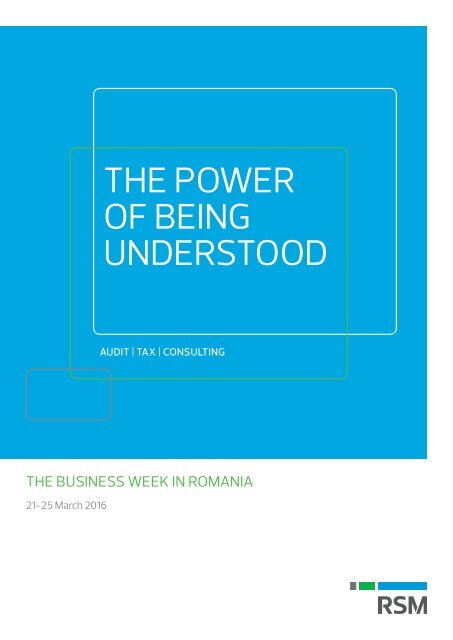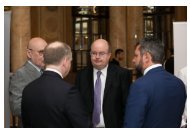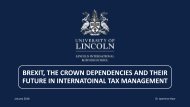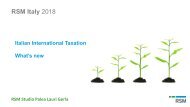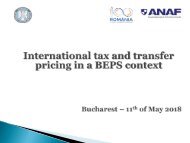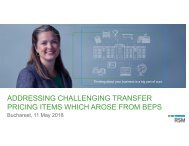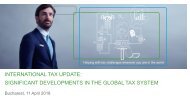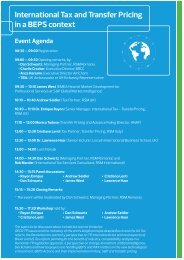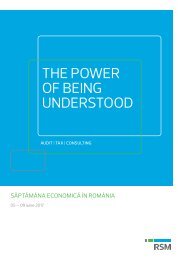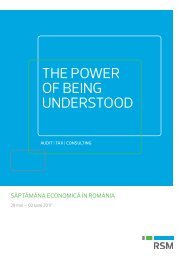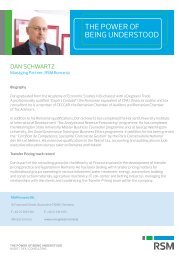RSM Romania_Business Brief_21-25.03.2016
Create successful ePaper yourself
Turn your PDF publications into a flip-book with our unique Google optimized e-Paper software.
THE POWER<br />
OF BEING<br />
UNDERSTOOD<br />
AUDIT | TAX | CONSULTING<br />
THE BUSINESS WEEK IN ROMANIA<br />
<strong>21</strong>-25 March 2016
MACRO:<br />
• Budget surplus<br />
The general consolidated budget finished the first two<br />
months of the year with a surplus of 0.8 billion lei, 0.1%<br />
of GDP, compared with 2.3 billion lei, 0.33% of GDP,<br />
for the same period of 2015, according to the figures<br />
released on Friday by the Ministry of Public Finance,<br />
reports Agerpress.<br />
At the end of January 2016 the budget surplus was 4.7<br />
billion lei, 0.63% of GDP. The revenues of the general<br />
consolidated budget, to the sum of 35.4 billion lei, 4.7%<br />
of GDP, were 4.6% larger at face value than for the<br />
same period of the previous year. Compared with the<br />
same period of the previous year there were significant<br />
increases in tax on profit paid into the budget (+39%),<br />
in tax on the use of goods (+20.3%), in social insurance<br />
contributions (+9.5%), excises (+5.9%), and in VAT<br />
(+4%). The expenditures of the general consolidated<br />
budget, to the sum of 34.6 billion lei, increased in<br />
nominal terms by 9.9% compared with the same period<br />
of the previous year and by 0.2 points as a percentage<br />
of GDP.<br />
At the beginning of the year, the European Commission<br />
estimated that in 2016 the budget deficit would<br />
increase in ESA terms to three per cent of GDP, the limit<br />
stipulated in the Maastricht Treaty. The state budget is<br />
built on a deficit of 2.95% of GDP.<br />
• Budget implementation below the deficit target in the<br />
first quarter<br />
Budget implementation in the first quarter will see a<br />
deficit below the established target, at 0.9% of GDP,<br />
given a level in March similar to that in February, at 0.5<br />
to 0.6% of GDP, and the situation in the first two months<br />
shows that the Government is attempting more even<br />
implementation, declared the chief economist of ING<br />
Bank, Ciprian Dascălu on Friday for news.ro. “Usually,<br />
we need at least a quarter to be able to see the<br />
evolution. In theory, we would expect the government,<br />
which does not necessarily have political targets, to<br />
have a budget implementation much closer to the plans<br />
announced,” added the economist.<br />
Dascălu stated that given that the deficit target<br />
for the first quarter is less than 0.9% of GDP, there<br />
was still enough room in March, considering that the<br />
implementation would be below target. “We expect<br />
there will continue to be strong consumption, and VAT<br />
receipts, given the way the first two months look, will<br />
still be positive. There is room for accommodation and<br />
perhaps for unexpected measures from Parliament,<br />
which might be taken in an electoral year, and so we<br />
don’t see any risk to the deficit this year,” said Dascălu.<br />
• The single currency in <strong>Romania</strong> perhaps in ten years<br />
The deputy governor of the National Bank of <strong>Romania</strong><br />
(BNR), Bogdan Olteanu, declared on Thursday, at a<br />
press conference in Sibiu, that <strong>Romania</strong> could be ready<br />
to introduce the single currency in about ten years, if<br />
steps are begun in the autumn of this year. “To finish<br />
a process you first have to begin it, and <strong>Romania</strong> has<br />
not yet begun preparations to move to the euro. If<br />
we began in the autumn of this year, let’s say, then<br />
from the technical standpoint we would probably<br />
be reasonably prepared in seven to ten years,” said<br />
Bogdan Olteanu when asked when <strong>Romania</strong> might<br />
adopt the euro. “<strong>Romania</strong> has committed herself to<br />
join the euro. It’s written in the Constitution and we<br />
voted for it in a referendum. It’s not written when<br />
this will happen, however. There are countries where<br />
politics reckons the later the better. For example, in<br />
Hungary, the Government has decided that when<br />
Hungary reaches a standard of living that is, let’s say,<br />
ninety per cent of the EU average, then it will be time<br />
to think about joining. From what we have seen in the<br />
countries that have joined, two third of the standard<br />
of living is a reasonable level to be able to get there<br />
without difficulties,” declared the deputy governor of<br />
the BNR. He gave Slovenia as an example: “a country<br />
which is now doing well, the economy is more and more<br />
competitive and people are earning more and more.”<br />
• Major change on the ghișeul.ro online platform<br />
Individual taxpayers can obtain online access data in<br />
the system in order to pay fines, taxes and local taxes<br />
over the internet. You no longer have to go to the local<br />
tax office in order to obtain access data for the system.<br />
From Friday 25 March, access data can be obtained<br />
within a few minutes by entering your CNP and the<br />
details of your bank card. A user name and password<br />
are sent to the e-mail address you provide, after which<br />
you can see what taxes you have to pay and, of course,<br />
pay them online.<br />
THE POWER OF BEING UNDERSTOOD<br />
AUDIT | TAX | CONSULTING
MACRO:<br />
• Following an investigation by hotnews.ro, the <strong>Romania</strong>n<br />
Electronic Payments Association (APERO), which<br />
developed and dealt with maintenance of the ghișeul.<br />
ro platform at zero costs for the <strong>Romania</strong>n State, made<br />
a number of harsh accusations against the authorities.<br />
According to APERO, for more than a year and a half<br />
the ghișeul.ro platform has been ready to interconnect<br />
with ANAF in order to start collecting fines, imposts<br />
and taxes from individual taxpayers, authorised<br />
freelancers, and legal entities. Moreover, since January<br />
2014, APERO proposed to the authorities a reduction in<br />
the commission for transactions on ghișeul.ro, from the<br />
present two per cent or maximum 30 lei to one per cent<br />
or a maximum of 20 lei. Not only did this not happen,<br />
but now the Ministry of Finance wants to pay for a new<br />
IT system to pay all taxes online.<br />
• Cybernetic security law a matter of urgency<br />
The Minister of Communications and for an IT Society,<br />
Marius Bostan, said at a conference on Friday that<br />
he will urgently request that Parliament debate a<br />
proposed cybernetic security law. “As a public official<br />
I will request an urgent debate of the proposed law<br />
in Parliament. The issue is already being discussed at<br />
the highest level. At the same time, it is obvious that<br />
in the next few years we will have to start from the<br />
bottom, from educating schoolchildren. The inclusion<br />
of cybernetic security in school curricula, with basic<br />
information, is very important. We think it is a good<br />
thing that such information be made known, for the<br />
sake of personal protection and dignity. I can tell you<br />
that at the moment we are working on these things,”<br />
said Marius Bostan. On Friday, the minister said that the<br />
proposed law could be approved within the Ministry of<br />
Communications next week, after which the document<br />
would be passed to the other ministries, before being<br />
adopted by the Government and then Parliament.<br />
Sources: CursdeGuvernare.ro, economica.net,<br />
Hotnews.ro, Mediafax.ro, news.ro, profit.ro<br />
BUSINESS<br />
• Privatisation to resume via BVB<br />
The privatisation programme might resume in 2016<br />
resume after a pause last year, with at least one<br />
imminent listing, said the director general of the<br />
Bucharest Stock Exchange (BVB), Ludwik Sobolewski<br />
in an interview with Reuters, quoted by Agerpress. The<br />
most likely candidate is salt producer Salrom, whereas<br />
the listing of energy producer Hydroelectrica is only<br />
a marginal possibility, as it will probably take place in<br />
2017, declared Sobolewski. “We are waiting for the<br />
privatisations to resume. 2015 passed without any<br />
major privatisations, but it is important that <strong>Romania</strong><br />
should continue the process, since we need large<br />
market companies,” explained Ludwik Sobolewski,<br />
adding: “there is a chance that it (Hydroelecrica) might<br />
be listed this year, but most likely the process will take<br />
place next year. It would be extremely important for<br />
the market.” In previous years, the Government floated<br />
Romgaz, Electrica and Nuclearelectrica. In 2015 other<br />
potential candidates for privatisation were identified,<br />
including Bucharest and Constanța airports, but the<br />
privatisation programme has stagnated. The Property<br />
Fund, which owns minority shares in Salrom and<br />
Hydroelectrica, supports the listing and is dissatisfied<br />
with the delay. The goal of the capital market in<br />
<strong>Romania</strong> is to graduate to the status of emerging<br />
market in the Morgan Stanley Capital International<br />
indices (MSCI), but there have to be at least three<br />
companies with sufficient market capitalisation in order<br />
to meet the requirements.<br />
• Projects worth more than 200 million euros launched<br />
at tIMOn<br />
Twenty new residential projects totalling more than<br />
1,500 homes were launched at this spring’s tIMOn. Most<br />
of the projects are located in central and semi-central<br />
areas and have been developed by new investors<br />
and existing players in the residential market. The<br />
investments involved in the projects amount to more<br />
than two hundred million euros, with funds supplied by<br />
both developers and banks. The new projects include<br />
Otopeni Central Residence, a complex of villas promoted<br />
by Alpha Group, and the Cherry Villas complex, also in<br />
Otopeni, featuring 304 apartments, developed by<br />
THE POWER OF BEING UNDERSTOOD<br />
AUDIT | TAX | CONSULTING
BUSINESS<br />
• GreenTech International. Renet presented three new<br />
residential projects situated in attractive areas, namely<br />
on the shore of Buftea Lake and in Otopeni: New Apple<br />
Residence, Otopeni North Residence, and Peninsula<br />
Residence. Also new is Citta Nusco, developed by Italian<br />
investor Nusco, making its debut in the local residential<br />
market after operating in the offices sector. Imoteca,<br />
a real-estate consultancy firm with a portfolio of<br />
two thousand apartments in <strong>Romania</strong>, is promoting<br />
six residential projects, four of which are aimed<br />
exclusively at the luxury segment: Vernescu Residence,<br />
Parisian View, Downtown Apartments, and Docenților<br />
Residence.<br />
• Shopping City Timişoara opens on 31 March<br />
The Shopping City Timișoara mall, developed by the<br />
NEPI investments fund, will open on 31 March after<br />
completion of the second phase of construction. The<br />
people of Timișoara will have access to the largest<br />
multiplex cinema outside Bucharest, which has thirteen<br />
rooms equipped with 3D technology, and also a fitness<br />
centre with a semi-Olympic swimming pool, bowling,<br />
billiards, a casino, a food court, and a children’s play<br />
area. The group also intends to open the country’s<br />
first indoor ski slope. By the end of renovation work,<br />
the total rentable surface area will be around seventy<br />
thousand square metres and the investment will have<br />
reached 83.8 million euros.<br />
• Hackathon, initiated by NASA, to be held in Cluj<br />
The NASA Space Apps Challenge Hackathon, one of<br />
the biggest programming competitions, is to take place<br />
in <strong>Romania</strong> for the first time, and will be organised<br />
by the Transylvania Entrepreneurship and Innovation<br />
Startup Centre on 23-24 April 2016. Enrolment began<br />
on 23 March. The competition is part of NASA’s Open<br />
Innovation Programme and is an Innovation Incubator<br />
of the U.S. space agency. The International Space Apps<br />
Challenge was launched in 2012. “Every year thousands<br />
of entrants from various fields (programmers,<br />
scientists, teachers, artists, designers, engineers,<br />
storytellers, students and entrepreneurs), regardless<br />
of their level of experience, work together to develop<br />
innovative, open-source solutions to problems with<br />
a global impact, connected both to space exploration<br />
and Earth’s social needs, using sets of data made<br />
available to the public by NASA,” say the organisers.<br />
The 2015 event reached more than fourteen thousand<br />
participants from sixty-two countries and 133 cities<br />
all over the world. We expect that this year’s event will<br />
be the biggest so far, since 193 cities from 72 countries<br />
have entered. The themes for the 2016 competition are<br />
Earth, Aeronautics, Technology, the International Space<br />
Station, Journey to Mars, From the Solar System to<br />
Infinity, each with its own set of challenges.<br />
• Bucharest City App, a capital applicationThe Bucharest<br />
City App is one of those simple things that are<br />
guaranteed to be a success and which make you say:<br />
“Why didn’t I think of that?” It is a complete application<br />
for Android and iOS, designed both for <strong>Romania</strong>ns<br />
and expats and foreign tourists, a free-time app in<br />
which can be found events, shows, parties, films:<br />
in effect the whole of Bucharest’s cultural, artistic<br />
and even underground life. The app not only gives<br />
complete listings of events, but also has sections on<br />
restaurants, cafés, clubs, spas, medical centres, tourist<br />
attractions, and public transport routes, as well as a<br />
metro map. Bucharest City was developed by tourist<br />
services company Eventur, which is run by Alex Filip<br />
and Dragoș Asaftei. The project was launched on 25<br />
January and at present has five hundred beneficiaries:<br />
theatres, restaurants, cafés, clubs, shops, hospitals and<br />
pharmacies. “The app was also visible online, with the<br />
help of one hundred and fifty blogs that presented it in<br />
the first week. It was also present offline, on television,<br />
radio and in the press. For two weeks the app was<br />
present all over the place,” says Alex Filip.<br />
Sources: Agerpres, business-adviser.ro, news.ro,<br />
profit.ro, start-upcafe.ro, zf.ro<br />
THE POWER OF BEING UNDERSTOOD<br />
AUDIT | TAX | CONSULTING


